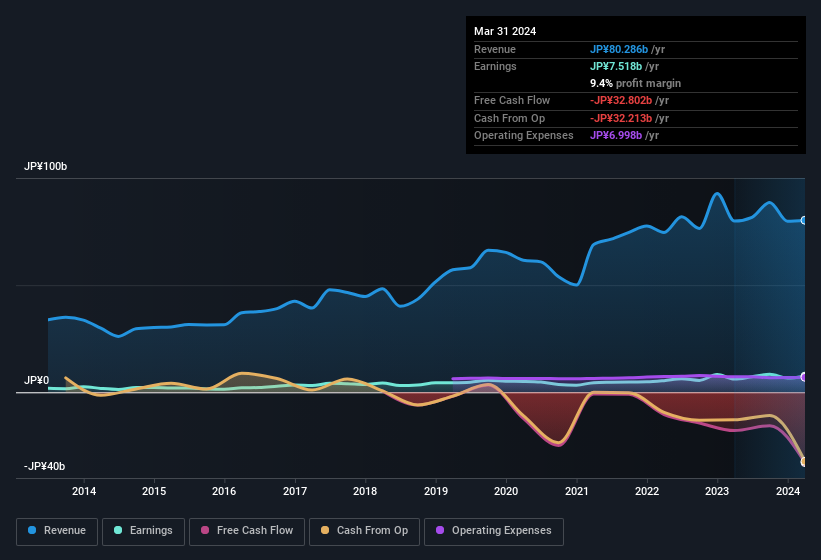- Japan
- /
- Consumer Durables
- /
- TSE:8877
Eslead's (TSE:8877) Shareholders May Want To Dig Deeper Than Statutory Profit
Eslead Corporation (TSE:8877) just released a solid earnings report, and the stock displayed some strength. However, we think that shareholders should be cautious as we found some worrying factors underlying the profit.
See our latest analysis for Eslead

Examining Cashflow Against Eslead's Earnings
As finance nerds would already know, the accrual ratio from cashflow is a key measure for assessing how well a company's free cash flow (FCF) matches its profit. The accrual ratio subtracts the FCF from the profit for a given period, and divides the result by the average operating assets of the company over that time. The ratio shows us how much a company's profit exceeds its FCF.
Therefore, it's actually considered a good thing when a company has a negative accrual ratio, but a bad thing if its accrual ratio is positive. While it's not a problem to have a positive accrual ratio, indicating a certain level of non-cash profits, a high accrual ratio is arguably a bad thing, because it indicates paper profits are not matched by cash flow. That's because some academic studies have suggested that high accruals ratios tend to lead to lower profit or less profit growth.
Eslead has an accrual ratio of 0.35 for the year to March 2024. Unfortunately, that means its free cash flow was a lot less than its statutory profit, which makes us doubt the utility of profit as a guide. Even though it reported a profit of JP¥7.52b, a look at free cash flow indicates it actually burnt through JP¥33b in the last year. We also note that Eslead's free cash flow was actually negative last year as well, so we could understand if shareholders were bothered by its outflow of JP¥33b.
Note: we always recommend investors check balance sheet strength. Click here to be taken to our balance sheet analysis of Eslead.
Our Take On Eslead's Profit Performance
As we have made quite clear, we're a bit worried that Eslead didn't back up the last year's profit with free cashflow. For this reason, we think that Eslead's statutory profits may be a bad guide to its underlying earnings power, and might give investors an overly positive impression of the company. But at least holders can take some solace from the 67% per annum growth in EPS for the last three. The goal of this article has been to assess how well we can rely on the statutory earnings to reflect the company's potential, but there is plenty more to consider. In light of this, if you'd like to do more analysis on the company, it's vital to be informed of the risks involved. Our analysis shows 3 warning signs for Eslead (2 don't sit too well with us!) and we strongly recommend you look at these bad boys before investing.
This note has only looked at a single factor that sheds light on the nature of Eslead's profit. But there is always more to discover if you are capable of focussing your mind on minutiae. For example, many people consider a high return on equity as an indication of favorable business economics, while others like to 'follow the money' and search out stocks that insiders are buying. So you may wish to see this free collection of companies boasting high return on equity, or this list of stocks with high insider ownership.
Valuation is complex, but we're here to simplify it.
Discover if Eslead might be undervalued or overvalued with our detailed analysis, featuring fair value estimates, potential risks, dividends, insider trades, and its financial condition.
Access Free AnalysisHave feedback on this article? Concerned about the content? Get in touch with us directly. Alternatively, email editorial-team (at) simplywallst.com.
This article by Simply Wall St is general in nature. We provide commentary based on historical data and analyst forecasts only using an unbiased methodology and our articles are not intended to be financial advice. It does not constitute a recommendation to buy or sell any stock, and does not take account of your objectives, or your financial situation. We aim to bring you long-term focused analysis driven by fundamental data. Note that our analysis may not factor in the latest price-sensitive company announcements or qualitative material. Simply Wall St has no position in any stocks mentioned.
About TSE:8877
Established dividend payer with mediocre balance sheet.
Market Insights
Community Narratives




